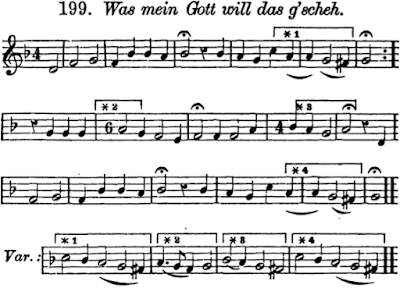GOOD night, my friends! To slumber blest
My body now is carried,
To lie awhile and gently rest
Within earth’s bosom buried;
The soul with God already lives
And is consoled forever,
Where nothing pain or anguish gives,
And sorrow cometh never.
2 Why mourn ye then that I depart?
Let go your lamentation!
Untainted gladness fills my heart,
Ye live in tribulation;
I go before; so follow ye;
No longer pain shall sting us
When God from all adversity
To endless joy shall bring us!
3 I would not take the world to be
A minute longer dwelling
Within your world of agony!
A treasure all-excelling,
Is mine from God my Maker dear;
Oh, what delight and gladness!
Come soon, dear friends. What have ye here
On earth but constant sadness?
4 Farewell! God’s mercy you defend,
And keep you all securely,
Who will yet go the way I wend.
God will His children surely
Bring all together on that Day.
What if death now may sever?
All grief and sighs shall flee away,
And we rejoice forever.
5 O God! Grant all who tarry here
In this poor life and lowly,
To turn to Thee in faith and fear
And be devoted wholly,
That they may hear the welcome word
And enter joy forever.
Oh, grant it, Jesus, faithful Lord,
By Thy good grace and favor!
Translation © 2024 Matthew Carver.
GERMAN
Nun gute Nacht, ihr Liebsten mein,
jetzt trägt man mich von hinnen,
mein Leib zu legn ins Grab hinein,
daß er fein sanft ruh drinnen. […sanft ruh darinnen.]
Die Seel ist allbereit bei Gott,
da wird sie ewg getröstet,
mit mir hats nunmehr keine Noth,
bin von allm Leid erlöset.
2 Was traurt ihr dann, daß ich hie scheid?
Laßt nur eur Trauren fahren.
Ich bin kommen zu ewger Freud, […zur ewgen Freud]
ihr lebt in allen Gfahren.
Ich geh voran, ihr kommt hernach,
denkt wie werdn wir uns freuen,
wann Gott vor allem Ungemach
uns ewig will befreien.
3 Glaubt frei, die ganz Welt ich nicht nehm, [Führwahr…]
daß ich ein eing Minute […ich einig Minute]
zu euch in dies Elend mehr käm,
so groß ist jetzt das Gute,
das mir Gott hat gegeben ein,
im Himmel, o welch Freude!
kommt bald hernach, ihr Liebste mein,
was habt ihr hie? Nur Leiden.
4 Ade, behüt euch Gott, ade,
die ihr denkt nachzukommen!
Den Weg zum Himmel ich jetzt geh,
dort gwisslich alle Frommen,
zusammen bringt der Jüngste Tag,
was achtn wir dann das Scheiden?
Ohn einig Leid, ohn alle Klag,
wir uns ewig werdn freuen. […uns werdn ewig freuen.]
5 Ach Gott, verleih, wer nach mir bleibt
in diesem armen Leben,
daß er fromm werd in der Gnadenzeit,
und sich dir ganz ergebe;
daß er dort hör: Du fromme Christ,
geh ein zu deins Herrn Freuden!
Ach helfs, du frommr Herr Jesu Christ,
in allen Gnaden. Amen.










